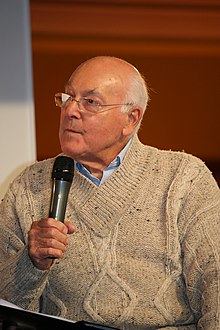Murray Walker
Graeme Murray Walker , OBE (known as Murray Walker ; born October 10, 1923 , Hall Green , Birmingham , England ) is a British reporter and television commentator . He became known to a broad, predominantly English-speaking audience through his work as Formula 1 reporter for the BBC (later ITV ), which he ended in 2001. Since then he has appeared sporadically as a commentator on classic car races or in other racing series.
Walker is considered a living reporter legend beyond Great Britain and enjoys cult status even with former Formula 1 greats. He was best known for his characteristic, enthusiastic way of commenting and for remarks made in the heat of the moment (known to many as "Walkerisms" or "Murrayisms" ), which a moment later were revealed as rash or as a slip of the tongue. Walker was also under the supposed curse of seeing a driver he had just described as an excellent driver with a chance of victory retiring for technical or driving reasons.
Early life
Murry Walker was born in 1923 to Graham Walker and Elsie Spratt. His father was a successful motorcycle racer in the 1920s and 1930s and has been a TT winner once and European champion twice during his career .
Walker attended Highgate School in London before being drafted and trained in the Royal Military Academy at Sandhurst during World War II . He took u. a. participated in the battle in the Reichswald and left the army with the rank of captain . After his military career, Walker worked in the advertising industry a. a. for Dunlop , Aspro , Mars , Vauxhall Motors and British Rail .
Reporter career
Murray Walker made his debut as a sports commentator in 1949 alongside Max Robertson , a former, well-known sports reporter for the BBC. Walker did not come into contact with Formula 1 until the 1970s, when British television did not yet broadcast every race live. From the 1978 season onwards, he commented on almost every Grand Prix for the BBC and ITV for 23 years until he was replaced by James Allen after the US Grand Prix in 2001 . As a farewell, he was presented with an original brick from the Speedway's original brickyard from the race track manager of the Indianapolis Motor Speedway , Tony George .
From the late 1980s onwards, Walker used his well-known name for the publication of numerous Formula 1 yearbooks, which appeared until 1997 under the title “Murray Walker's Grand Prix Year” .
In November 1997 he was awarded an honorary doctorate from Bournemouth University , and in July 2005 he was also awarded a Dr. H. c. from Middlesex University in London.
Walker returned sporadically as a reporter in the following years. For example, he commented on all four races of the Grand Prix Masters Series for former Formula 1 drivers for Sky Sports in 2005 and 2006 . In January 2006, BBC Radio 5 Live also announced that Walker would be part of its commentary team for a number of races.
In March 2006, Walker was introduced as a representative of the newly formed Honda Racing F1 Team, which emerged from the Formula 1 racing team British American Racing (BAR) at the end of 2005 . The engagement included Walker handling the greeting and entertainment of the team's VIP guests for half of the 18 Grands Prix season.
He also returned to the microphone in March 2006 for a Clipsal 500 V8 Supercar race in Adelaide ; in April he even commented on the Australian Formula 1 Grand Prix for the Australian television station Network Ten . In March 2007, he again commented on the Clipsal 500 V8 Supercar Round in Adelaide and was then honored with the lifelong entitlement to attend the event as a guest of honor. He also commented on the Australian Grand Prix 2007 again as part of the Network Ten team. In July 2007, Walker stepped in as a replacement for BBC commentator David Croft, whose wife was expecting a child, and commented on the European Grand Prix . In July 2008, he also commented on both races of the historic Formula 1 as part of the Silverstone Classic for Motors TV .
Advertising character
At the end of the 1990s, Walker played alongside former British Formula 1 world champion Damon Hill as the main character in a commercial for the Pizza Hut fast food chain . Both Walker's urge to comment and Hill's image were caricatured as eternal second: After the commentator had finished his pizza in front of the racing driver, he shouted, as if at the finale of an exciting race: “And Hill finishes second ... again!”. Walker later set music to a commercial for the National Motor Museum in Beaulieu .
literature
- Murray Walker: Unless I'm Very Much Mistaken . Willow, London 2003, ISBN 0-00-712697-2 .
- Murray Walker: Murray Walker's Formula One Heroes . Virgin Books, London 2001, ISBN 978-1-85227-918-9 .
| personal data | |
|---|---|
| SURNAME | Walker, Murray |
| ALTERNATIVE NAMES | Walker, Graeme Murray |
| BRIEF DESCRIPTION | British Formula 1 commentator |
| DATE OF BIRTH | October 10, 1923 |
| PLACE OF BIRTH | Hall Green , Birmingham |
